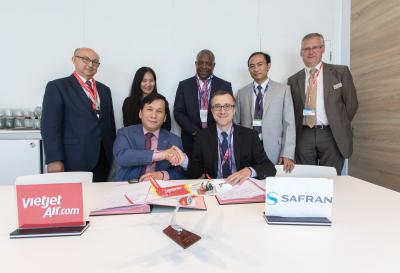VietJet Air and Safran sign SFCO2® service agreement
21 Jun 2017
{{vendor.Name}}
Connect with Aircraft IT
Sign up to the Aircraft IT twitter feed for all the aviation industry's latest IT related news
Click here to learn about free Membership to Aircraft IT
VietJet Air and Safran sign SFCO2® service agreement

Le Bourget, June 21st, 2017 – Safran has added a new customer, VietJet Air, Vietnam’s leading private airline, for its SFCO2® fuel efficiency solution.
The SFCO2 service contract spans five years, starting in 2017, and covers the entire fleet of the Ho Chi Minh City-based airline. It will help VietJet Air improve its operational efficiency by reducing fuel consumption and CO2 emissions. The agreement provides for operational recommendations from Safran’s SFCO2 teams, along with a special SFCO2 web application that enables the airline to track its progress and potential savings.
The SFCO2 solution combines the expertise of Safran Aircraft Engines, one of the world’s leading aero-engine manufacturers, with the long-standing experience of Safran Electronics and Defense in flight data analysis.
“We are very confident that Safran’s SFCO2® service will enable us to meet our fuel consumption efficiency objectives, so that we can combine economic and environmental friendly performance,” said Dinh Viet Phuong, Vietjet Vice President.
“We are proud of winning this contract to support VietJet Air’s day-to-day performance and dynamic growth over the next five years,” said François Planaud, Vice President Services & MRO. “Our selection by VietJet air confirms the effectiveness of our SFCO2® service and provides further recognition of our global expertise in fuel efficiency solutions.”
Fuel is the largest expense for airlines, representing 25 to 30% of their direct operating costs. By analyzing both operational and maintenance aspects, Safran’s SFCO2® service develops procedures and recommendations to address airlines’ need for greater fuel efficiency.
With this comprehensive solution, airlines can reduce their fuel consumption up to 5%. For a fleet of 20 single-aisle jets, for instance, flying an average of 3,500 hours/year, that would equal annual savings of $5 million, and avoid releasing 26 000 tons of carbon dioxide (CO2) into the atmosphere
